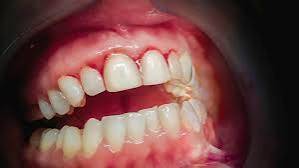Gingivitis is the early stage of gum disease and involves inflammation of the gums. It is often reversible if treated early but can lead to more serious conditions like periodontitis if neglected.
---
Causes of Gingivitis
1. Plaque Buildup: The primary cause is the accumulation of plaque, a sticky film of bacteria, on the teeth and gums.
2. Poor Oral Hygiene: Not brushing and flossing regularly allows plaque to harden into tartar, leading to gum irritation.
3. Smoking or Tobacco Use: Tobacco products reduce gum health and make it harder for gums to heal.
4. Hormonal Changes: Pregnancy, menstruation, or menopause can make gums more sensitive and susceptible to inflammation.
5. Diabetes: Diabetic patients are more prone to infections, including gum disease.
6. Certain Medications: Drugs that reduce saliva flow, such as antihistamines and certain heart medications, can contribute to gingivitis.
7. Poor Nutrition: Lack of essential vitamins, especially vitamin C, can lead to weakened gums.
8. Immune System Conditions: Conditions that compromise the immune system, like HIV/AIDS, increase susceptibility to infections, including gum disease.
---
Signs and Symptoms of Gingivitis
1. Red or Swollen Gums: The gums may appear red, swollen, or puffy.
2. Bleeding Gums: Gums bleed easily, especially when brushing or flossing.
3. Receding Gums: Gums may begin to pull away from the teeth.
4. Tenderness: Gums can feel sore or tender when touched.
5. Bad Breath: Persistent bad breath (halitosis) caused by bacterial buildup in the mouth.
---
Effects of Gingivitis
1. Progression to Periodontitis: If left untreated, gingivitis can advance to periodontitis, a more severe form of gum disease that can lead to tooth and bone loss.
2. Increased Tooth Sensitivity: As gums recede, tooth roots may become exposed, causing sensitivity to hot, cold, or sweet foods.
3. Tooth Loss: Severe gum disease can result in tooth mobility and eventual tooth loss if the underlying bone is damaged.
4. Pain and Discomfort: Gingivitis can cause ongoing gum pain and sensitivity.
5. Systemic Health Implications: Chronic gum inflammation has been linked to other health issues, such as cardiovascular disease and diabetes.
---
Solutions and Treatments for Gingivitis
1. Improved Oral Hygiene:
Brushing and Flossing: Brush at least twice a day and floss daily to remove plaque from between teeth and along the gum line.
Antibacterial Mouthwash: Use an antiseptic or antibacterial mouthwash to help reduce plaque and bacteria.
2. Professional Dental Cleaning:
Scaling and Root Planing: A dentist can remove tartar buildup through professional cleaning and root planing, which smooths the root surfaces and prevents plaque from adhering.
3. Quit Smoking:
Stop Tobacco Use: Quitting smoking or chewing tobacco can significantly improve gum health and reduce inflammation.
4. Addressing Underlying Health Issues:
Control Diabetes: Managing blood sugar levels can help reduce the risk of gum disease.
Review Medications: Consult a healthcare provider if medications cause dry mouth, as this can lead to plaque buildup.
5. Dietary Improvements:
Balanced Diet: Eating a diet rich in vitamins, particularly vitamin C, supports immune function and gum health.
Hydration: Staying well-hydrated helps maintain saliva flow, which naturally cleanses the mouth.
6. Regular Dental Checkups:
Frequent Checkups: Routine dental visits allow early detection and management of gingivitis before it progresses.
7. Use of Electric Toothbrushes:
Electric or Sonic Toothbrush: These types of toothbrushes can more effectively remove plaque than manual brushing, especially along the gum line.
8. Gum Massage:
Gum Stimulation: Massaging the gums can improve blood circulation, promoting healthier gum tissue.
---
Gingivitis is largely preventable and reversible with good oral care, a healthy diet, and regular professional dental cleanings. By addressing gingivitis early, you can avoid its progression to more serious stages of gum disease, protecting both oral and overall health.


